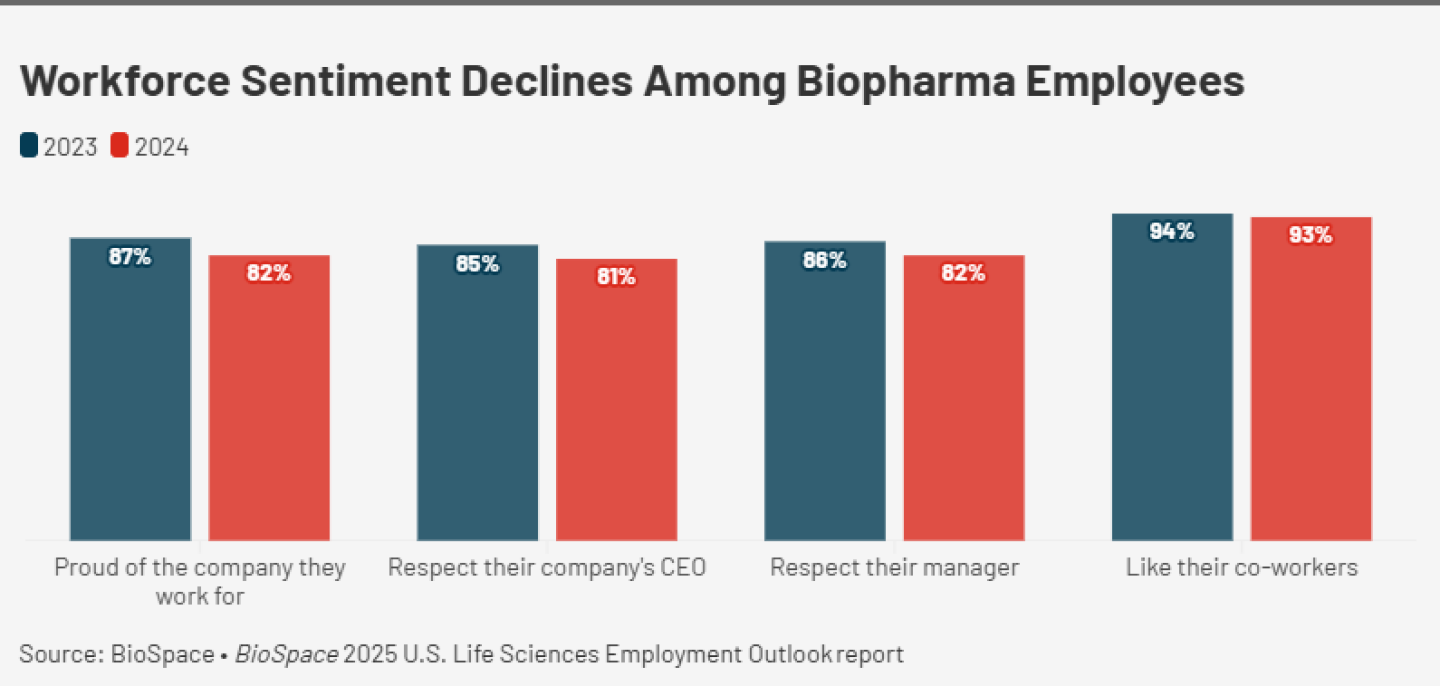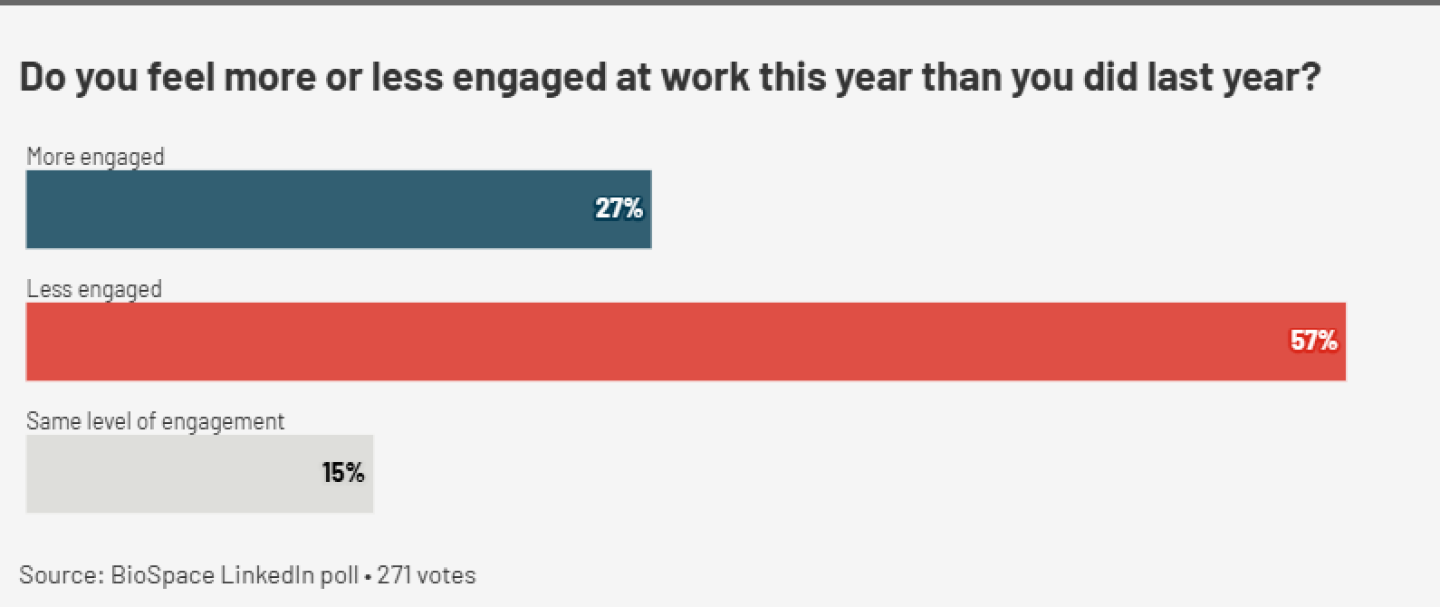Global employee engagement fell two percentage points in 2024, according to Gallup, while BioSpace found that workforce sentiment decreased among biopharma professionals. Additionally, a recent BioSpace poll suggests engagement could continue to decline in 2025.
Global employee engagement dipped in 2024, according to Gallup’s latest State of the Global Workplace report. That finding aligns with BioSpace data showing a decline last year in workforce sentiment among biopharma professionals, suggesting that engagement within that group likely decreased, as sentiment influences engagement.
The global percentage of engaged employees fell from 23% in 2023 to 21% in 2024, according to Gallup. There was a slightly smaller decrease in the U.S. and Canada region, from 32% to 31%.
Managers experienced the sharpest decline globally. Their engagement fell from 30% to 27%, while individual contributors’ engagement remained flat at 18%.
According to the BioSpace 2025 U.S. Life Sciences Employment Outlook report, workforce sentiment also declined last year. In the largest drop, 82% of survey respondents were proud of the company they work for, down from 87% in 2023.
Global Engagement Dip Matches 2020 Decline
Porschia Parker-Griffin, founder and CEO of Fly High Coaching, said Gallup’s findings were not surprising and highlighted one in particular: that global employee engagement fell two percentage points in 2024, just as it did when the COVID-19 pandemic erupted. In 2020, it dropped from 22% to 20%.
There are parallels between the time periods, Parker-Griffin noted.
“There’s a lot of global and economic uncertainty right now that, I think, is affecting all industries in alignment with how it was right during the pandemic,” she said.
Parker-Griffin also noted the significance of managers experiencing the largest global engagement decline and pointed out that people often forget about middle managers, specifically. They must ensure not only that executives and leadership teams are happy but also that individual contributors and staff-level employees are engaged and productive, she said.
“Many managers that we talk to feel like they’re stuck between a rock and a hard place while they’re focusing on everyone else instead of themselves,” Parker-Griffin added. “So, in a lot of ways, managers can feel as though they’re last on the priority list.”
Biopharma Layoffs, Lack of Flexibility Hurt Engagement
Gallup’s findings apply to biopharma employees as well, according to Parker-Griffin. Regarding why engagement would fall for these professionals, she noted that layoffs, reorganizations and other aspects of organizational change and culture play a big part in the ability to be engaged.
Layoffs draw criticism among survey respondents
Regarding job loss specifically, Parker-Griffin noted that workforce cuts add to the feeling of uncertainty among employees and make it hard for engagement to be high.
Layoffs have been prevalent in biopharma during the past few years. In 2024, thousands upon thousands of biotech and pharma professionals lost their jobs at companies of all sizes. Heavy hitters including Johnson & Johnson, Bristol Myers Squibb and Bayer were among the organizations making cuts.
Survey respondents for the BioSpace employment outlook report shared sharp criticism about layoffs. One person commented that they’re no longer encouraging young students to seek STEM careers because “life is hell when you are thrown out of work for no fault of your own.” Another noted the lack of commitment from employer to employee, adding, “Employees are dispensable!”
Yet another commented, “I’m looking for a position outside of pharma due to the lack of loyalty, positive culture, and future layoffs.”
That survey respondent was far from alone in looking for another position. Job hunting was a common theme in the Gallup and BioSpace reports. Gallup found that globally, 50% of its survey respondents were watching for or actively seeking a new job. Among those BioSpace surveyed, 59% who were employed or students said they’ll actively look for jobs this year.
Working on-site a negative for some more than others
In addition to layoffs, Parker-Griffin also cited the return-to-office movement, which affects organizational culture, as having an impact on biopharma employees’ engagement. However, she noted that there are differences along generational lines in terms of who thinks working on-site is more important. In general, she explained, older generations—Gen Xers and baby boomers—have a higher priority on returning to the office than millennials and Gen Zers.
Gender plays a role as well, Parker-Griffin noted. She said that due to reasons including family priorities, many women prefer more flexibility when it comes to hybrid or remote work.
Parker-Griffin’s comments align with Gallup’s findings. The Gallup report listed new employee desires regarding flexibility and remote work as one reason for decreased employee engagement.
Some BioSpace employment outlook survey respondents commented on the importance of working remotely. One wrote that “Biopharma needs to embrace permanent remote work options and stop with return-to-office mandates for no reason. There’s no reason for someone to drive to the office just to take zoom calls all day.”
Employee Engagement May Not Improve in 2025
Regarding how biopharma employees’ engagement will fare in 2025, Parker-Griffin said it’s difficult to predict given so many external factors affect how organizations are doing—and subsequently how their company culture affects engagement. Continued layoffs, the challenging job market and expected pharmaceutical tariffs are just a few issues causing uncertainty for employers and employees, she noted.
If she had to make a guess, Parker-Griffin said, employee engagement will be similar in 2025 to how it was in 2024. A recent BioSpace LinkedIn poll suggests there could be a decline. When asked about their level of engagement at work this year, 57% of respondents said they feel less engaged now than in 2024.
How Culture Can Affect Engagement
In discussing employee engagement, Parker-Griffin highlighted the importance of organizational culture, as that affects engagement. She said the biggest mistake businesses make when it comes to culture is avoiding talking about it.
“Most companies now, they have a vision, mission, values, and it is up on the wall somewhere or in the employee handbook, and that’s where it stays,” Parker-Griffin said.
She recommended that organizations start addressing culture by getting an idea of current employee sentiment. How are people feeling? What do they think about how the company is doing in the economy? How do they feel about their job security? What do they think about how leadership is planning to lead the organization into the future?
Next, Parker-Griffin recommended that companies make strategic changes where needed.
“And then, of course, if it’s a larger organization,” she said, “you have to be more strategic about how those conversations go, how that information is disseminated, how people, in terms of employees, really get the feeling that the organization values them but also has strong leadership that is going to overcome all of this uncertainty.”
Interested in more career insights? Subscribe to Career Insider to receive our quarterly life sciences job market reports, career advice and more.








